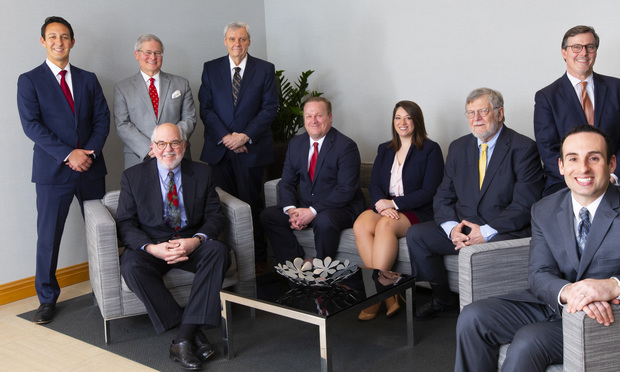Greenbaum Rowe Bolts on Health Care Practice With 9 McElroy Deutsch Laterals
The group is largely made up of attorneys who joined McElroy Deutsch in mid-2011 via its acquisition of 13-lawyer Kalison, McBride, Jackson & Robertson of Warren.
February 25, 2020 at 04:46 PM
6 minute read
 Standing (l to r): John Kaveney, Partner; Robert Hille, Partner; Neil Sullivan, Counsel; James Robertson, Partner & Department Chair. Seated (l to r): Andrew McBride III, Of Counsel; Paul Croce, Counsel; Megan George, Counsel; John Zen Jackson, Of Counsel; Glenn Prives, Partner. Greenbaum Rowe's health care practice added in February 2020. Courtesy photo.
Standing (l to r): John Kaveney, Partner; Robert Hille, Partner; Neil Sullivan, Counsel; James Robertson, Partner & Department Chair. Seated (l to r): Andrew McBride III, Of Counsel; Paul Croce, Counsel; Megan George, Counsel; John Zen Jackson, Of Counsel; Glenn Prives, Partner. Greenbaum Rowe's health care practice added in February 2020. Courtesy photo.
Adding what firm leaders continue to view as a growing practice area and pushing its attorney head count closer to the 100 mark, Greenbaum, Rowe, Smith & Davis has added a group of nine health care attorneys from fellow New Jersey-based firm McElroy, Deutsch, Mulvaney & Carpenter.
Four partners. James Robertson, Robert Hille, John Kaveney and Glenn Prives; three counsel, Paul Croce, Megan George and Neil Sullivan; and two of counsel, John Zen Jackson and Andrew McBride III, come to Greenbaum Rowe in the move, effective Feb. 10 and announced later in the month.
The group is largely made up of attorneys who joined McElroy Deutsch in mid-2011 via its acquisition of 13-lawyer Kalison, McBride, Jackson & Robertson of Warren.
Robertson heads the new practice group for Greenbaum Rowe, as he had done for McElroy Deutsch. Hille is former New Jersey State Bar Association president.
All group members are located in Greenbaum's Roseland office except Jackson, who is located in the firm's Iselin headquarters.
Greenbaum Rowe has represented some physician groups and health care entities over the years, but health care "was not a big part of our practice by any stretch," co-managing partner W. Raymond Felton said in an interview Tuesday. The firm, he said, sees it as a "growth area."
"We were definitely looking to find a health care attorney or, better yet, a group of attorneys," Felton said, noting that talks with the McElroy Deutsch group dated back to the third quarter of 2019. "It's vital to be in that practice. It's vital to the New Jersey economy—to anybody's economy."
The move, and the importance of health care practice more broadly, also reflects increased specialization in the legal industry, he added.
McElroy Deutsch, which had five health care lawyers in 2011 when the Kalison McBride contingent came on, as the Law Journal reported at the time, still lists 19 lawyers in its health care practice following the group departure. Managing partner Edward Deutsch said the firm had grown its health care practice in other ways since the 2011 addition.
"We're certainly staying in the health care business," Deutsch said in an interview Tuesday, adding that "we still do a lot of hospital work," including the recent pickup of two transactional engagements for hospitals.
He said the firm is positioned to continue handling health care industry transactional work but might look for "some more senior lateral people in the regulatory area."
"The thing that has affected the traditional health care practices is, there's been such a condensation of hospitals, and there aren't as many independent hospitals anymore," Deutsch said, adding that the regulatory side of the practice "becomes more and more competitive, I think."
No new practice chair has been appointed yet, but departures are an "opportunity for young people to move up and get more responsibility," Deutsch said. "The young people here … they're looking to grow the practice."
As for the group's departure, "there's no hard feelings here—none," Deutsch said. "They left in a very professional manner."
Robertson, also reached by phone Tuesday, echoed the notion that it was an amicable departure, and pointed to what he called a "clearer opportunity" at Greenbaum.
"We decided that the transition to Greenbaum made sense from a business perspective," Robertson said, pointing to entrepreneurial and midmarket business clients, strong transactional practice, including private equity, and opportunity for individual advancement as draws.
"More and more we're seeing our health care clients being approached by private equity funds," Robertson said. "Being in this platform gives us a clearer opportunity to do that work."
Robertson added that the transition from a large to midsize firm wasn't a significant consideration. Greenbaum Rowe's practice base is expected to generate work for the group, and vice versa, and "that doesn't necessarily translate into number of lawyers," he said.
It has been an eventful several months for Greenbaum Rowe, which in the fall opened a Monmouth County office in Holmdel and months later saw the Jan. 1 departure of its real estate department vice chairman, Matthew Schiller, and another partner, Charles Wilkes, to what is now Murphy Schiller & Wilkes of Newark, a real estate boutique.
Schiller in an email Tuesday called Greenbaum "an amazing firm, with an incredible historical legacy and absolutely incredible attorneys."
It was "a particularly difficult decision for me to make" but "the economics of the legal industry are shifting rapidly as technology and other cost sensitivities are significantly impacting the industry" and the opportunity to "build a modern, highly sophisticated, commercial real estate boutique law firm (a niche that we don't believe currently exists in New Jersey) capable of providing the same caliber of legal services as New Jersey's elite, much larger institutional firms, but on a much more cost-efficient and client-focused basis, was too great to pass up," Schiller said.
Felton said the duo "left on very good terms" and are "both very entrepreneurial."
The McElroy Deutsch group, along with the additions of family law partners Frank Louis and Jeanette Russell earlier in February, push Greenbaum's attorney total to 95. It had dipped to the low 80s at some points in recent years, according to Felton.
Felton said his firm figures to remain active in the lateral market. "For every opportunity or call or initial meeting you have, it's still a very small percentage that result in a completed deal like this."
This content has been archived. It is available through our partners, LexisNexis® and Bloomberg Law.
To view this content, please continue to their sites.
Not a Lexis Subscriber?
Subscribe Now
Not a Bloomberg Law Subscriber?
Subscribe Now
NOT FOR REPRINT
© 2025 ALM Global, LLC, All Rights Reserved. Request academic re-use from www.copyright.com. All other uses, submit a request to [email protected]. For more information visit Asset & Logo Licensing.
You Might Like
View All
Neighboring States Have Either Passed or Proposed Climate Superfund Laws—Is Pennsylvania Next?
7 minute read
An Overview of Proposed Changes to the Federal Rules of Procedure Relating to the Expansion of Remote Trial Testimony
15 minute readLaw Firms Mentioned
Trending Stories
- 1No Two Wildfires Alike: Lawyers Take Different Legal Strategies in California
- 2Poop-Themed Dog Toy OK as Parody, but Still Tarnished Jack Daniel’s Brand, Court Says
- 3Meet the New President of NY's Association of Trial Court Jurists
- 4Lawyers' Phones Are Ringing: What Should Employers Do If ICE Raids Their Business?
- 5Freshfields Hires Ex-SEC Corporate Finance Director in Silicon Valley
Who Got The Work
J. Brugh Lower of Gibbons has entered an appearance for industrial equipment supplier Devco Corporation in a pending trademark infringement lawsuit. The suit, accusing the defendant of selling knock-off Graco products, was filed Dec. 18 in New Jersey District Court by Rivkin Radler on behalf of Graco Inc. and Graco Minnesota. The case, assigned to U.S. District Judge Zahid N. Quraishi, is 3:24-cv-11294, Graco Inc. et al v. Devco Corporation.
Who Got The Work
Rebecca Maller-Stein and Kent A. Yalowitz of Arnold & Porter Kaye Scholer have entered their appearances for Hanaco Venture Capital and its executives, Lior Prosor and David Frankel, in a pending securities lawsuit. The action, filed on Dec. 24 in New York Southern District Court by Zell, Aron & Co. on behalf of Goldeneye Advisors, accuses the defendants of negligently and fraudulently managing the plaintiff's $1 million investment. The case, assigned to U.S. District Judge Vernon S. Broderick, is 1:24-cv-09918, Goldeneye Advisors, LLC v. Hanaco Venture Capital, Ltd. et al.
Who Got The Work
Attorneys from A&O Shearman has stepped in as defense counsel for Toronto-Dominion Bank and other defendants in a pending securities class action. The suit, filed Dec. 11 in New York Southern District Court by Bleichmar Fonti & Auld, accuses the defendants of concealing the bank's 'pervasive' deficiencies in regards to its compliance with the Bank Secrecy Act and the quality of its anti-money laundering controls. The case, assigned to U.S. District Judge Arun Subramanian, is 1:24-cv-09445, Gonzalez v. The Toronto-Dominion Bank et al.
Who Got The Work
Crown Castle International, a Pennsylvania company providing shared communications infrastructure, has turned to Luke D. Wolf of Gordon Rees Scully Mansukhani to fend off a pending breach-of-contract lawsuit. The court action, filed Nov. 25 in Michigan Eastern District Court by Hooper Hathaway PC on behalf of The Town Residences LLC, accuses Crown Castle of failing to transfer approximately $30,000 in utility payments from T-Mobile in breach of a roof-top lease and assignment agreement. The case, assigned to U.S. District Judge Susan K. Declercq, is 2:24-cv-13131, The Town Residences LLC v. T-Mobile US, Inc. et al.
Who Got The Work
Wilfred P. Coronato and Daniel M. Schwartz of McCarter & English have stepped in as defense counsel to Electrolux Home Products Inc. in a pending product liability lawsuit. The court action, filed Nov. 26 in New York Eastern District Court by Poulos Lopiccolo PC and Nagel Rice LLP on behalf of David Stern, alleges that the defendant's refrigerators’ drawers and shelving repeatedly break and fall apart within months after purchase. The case, assigned to U.S. District Judge Joan M. Azrack, is 2:24-cv-08204, Stern v. Electrolux Home Products, Inc.
Featured Firms
Law Offices of Gary Martin Hays & Associates, P.C.
(470) 294-1674
Law Offices of Mark E. Salomone
(857) 444-6468
Smith & Hassler
(713) 739-1250








